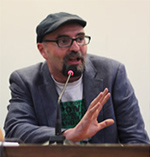UC San Diego Humanities Professor Awarded Fellowship to Study Lithium Triangle
Published Date
Article Content

UC San Diego Professor Luis Martin-Cabrera. Photo by UC San Diego Department of Literature
University of California San Diego’s Luis Martin-Cabrera has been named a 2016 Whiting Public Engagement (WPE) Fellow by the Whiting Foundation for his proposal to investigate the lives of indigenous groups living in a region known as the “Saudi Arabia of Lithium.” A key component in rechargeable batteries for laptops and cell phones, lithium is actively mined in Argentina, Bolivia and Chile. This activity is changing the landscape and the lives of people living in the region. As a fellow, Martin-Cabrera will receive $40,000 to fund six consecutive months of leave to work on his ambitious, public-facing project.
“This is an amazing opportunity of support from the Whiting Foundation for Luis, whose work represents the powerful impact of humanist-scholars on the common good,” said Division of Arts and Humanities Dean Cristina Della Coletta. “Successes like these are wonderful to share with our students so they understand just how vital a humanities education can be.”
Martin-Cabrera, associate professor of Peninsular and Latin American Literature and Culture in the Department of Literature, said that he feels extremely happy and proud to represent UC San Diego in this project that places the accent on both the value of public education and the humanities to resolve world challenges.
“As a specialist in Latin American culture, I am also very pleased to see that the Whiting Foundation is showing interest in this region that possesses 85 percent of the world’s lithium reserves, and yet is one of the poorest and most unequal regions of the globe,” he said. “I see this as a once-in-a-lifetime opportunity to connect worlds that tend to be apart from each other using the unique vantage point of the humanities, which can be part of the solution.”
According to Martin-Cabrera, the goal of his project is twofold: to collect testimonials from the Kolla, Aymara and Quechua communities that have lived in the lithium triangle for generations, and to construct a public cyber-sphere that connects these historically subjugated communities to other actors—companies, consumers, governments, NGOs, etc., involved in lithium extraction on both hemispheres.
“This public cyber-sphere should lead to a better understanding of the human and ecological consequences of lithium extraction,” said Martin-Cabrera, who noted that when we turn on our computers or cellphones, we rarely think about the origin of the batteries that power them. “So this is an opportunity to make those connections, to think about the origin of these minerals and the effect that its extraction has on the environment and the communities south of the border. Hopefully, this dialogue will lead to more sustainable alternatives or will, at the very least, tame our unchecked cyber-utopianism.”
He and seven other fellows selected from a variety of schools across the nation will convene in the summers of 2016 and 2017 to plan and discuss their work, talk with senior scholars who are experienced public humanists and participate in an intensive one-day workshop with the OpEd Project. Each fellow will also receive an additional stipend of up to $10,000 to cover project costs such as travel, collaboration, technology and training.
With expertise in subject areas that include English, American studies, classics, history, global studies, environmental humanities and African-American studies, the fellows were selected for projects that broadly impact certain public audiences. Besides Martin-Cabrera’s project, others include: an “app” delivering rich historical context to important American cultural sites; a collection of oral histories of diverse Brooklyn residents; a series of exhibitions created by prisoners; and a podcast of the looting of antiquities. Despite the diversity in projects, the goal of each is the same—to effectively communicate the knowledge and expertise gained from in-depth study of the humanities to a larger, public audience.
According to the Whiting Foundation, the purpose of this introductory fellowship is to bring attention to the unique and profound work of humanities scholars—award-winning documentaries, groundbreaking books, acclaimed podcasts and informative websites—that draws on and requires the deep thinking, historical and contextual expertise and rich analysis of the humanities to inform our daily modern lives.
The UC San Diego Department of Literature is listed among the top 40 programs nationally, according to education rankings by U.S. News & World Report.
Share This:
Stay in the Know
Keep up with all the latest from UC San Diego. Subscribe to the newsletter today.



